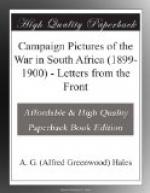I suppose that cases of treachery have really occurred during the war. In a mixed crowd like that which composes the burgher army, there are sure to be some mortals fit to do any mean trick, just as sure as there are men fit to do or say anything in the British Army, But I cannot, and I will not, believe that the great bulk of these men are such paltry cowards as to make the “white flag” act a common one. It may be news to British readers to know that the burghers complain of the behaviour of our troops as bitterly as we complain of theirs; and I think, from personal observation, that their charges are as groundless as are some charges made by the same class of hysterical individuals, though of different nationality. Their pet hatred, when I was a prisoner in their hands, was the Lancers. They used to swear that the Lancers never spared a wounded man, but ran him through as they galloped past him. I was told this fifty times, and each time told my informant flatly that I declined to believe the assertion, and should continue to disbelieve it until I had undeniable proof, for it would take a good deal to convince me that a British soldier would strike a fallen foe even in the heat and stress of battle. One day they asked me to come and look at the dead body of one of their field cornets, whom they alleged to have been done to death whilst wounded by our Lancers. I went and saw the man, and at a glance saw that the wounds were not lance wounds at all, but ripping bullet wounds. He had been sniped by some Australian riflemen from a high kopje whilst in a valley. I tried to explain this to the excited burghers, but they only sneered at me for my trouble, until one of their own doctors coming along had a look at the corpse, and promptly verified my statements. That calmed them considerably, and they looked at the thing in cooler blood, and soon saw that it was really absurd to put the blame of the man’s death on the shoulders of the Lancers, though they stoutly maintained that our cavalry were at times guilty of such monstrous conduct. I have often heard them solemnly swear never to give a Lancer a chance to surrender if they once got him within rifle range.
Personally, I could never see just what the Boers would gain by the white flag business. As a rule, our troops did not want coaxing into rifle range; they marched within hitting distance readily enough, and did not require a white flag to lure them into a tight place, so that the object to be gained by the enemy by such disgraceful tactics never seemed to me to be too apparent. If they had ever by such means been able to entrap an army, or to bring about the wholesale slaughter of our men, I could understand things a bit better; but they had little to gain and an awful lot to lose by such tactics. There is no slight risk attached to the act of firing on an advancing army treacherously under cover of the white flag. Such a deed rouses all the slumbering devil in the men, and the foe found guilty of such a deed would get more bayonet than he would find conducive to his health when it came to his turn to be beaten.




